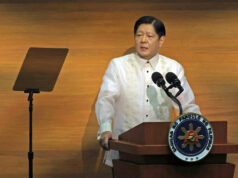Aquino, Abad charged over DAP controversy
THE OFFICE of the Ombudsman has indicted former president Benigno S. C. Aquino III and former budget secretary Florencio B. Abad in connection with the controversial Disbursement Acceleration Program (DAP) midway into Mr. Aquino’s administration.
Ombudsman Conchita Carpio-Morales approved on June 14 the resolution, dated May 22, after finding probable cause for Usurpation of Legislative Powers.
In the resolution, the Special Panel partially granted a motion for reconsideration (MR) filed by Carlos Isagani T. Zarate, Renato Reyes, Benjamin Valbuena, Dante LA Jimenez, Mae Paner, Antonio Flores, Gloria Arellano and Bonifacio Carmona, Jr.
The Special Panel also denied Mr. Abad’s MR to reverse the Ombudsman’s decision on his criminal and administrative liabilities.
“(A) re-evaluation of the case establishes that the individual actions of respondent Aquino and respondent-movant Abad showed a joint purpose and design to encroach on the powers of Congress by expanding the meaning of savings to fund programs, activities and projects under the DAP,” the resolution said, as quoted in a statement by the Ombudsman.
The DAP, implemented through the National Budget Circular (NBC) 541, authorized the withdrawal of P72 billion in “unobligated allotments of agencies with low levels of obligations as of 30 June 2012.”
Certain provisions of the program had been flagged by the Supreme Court as unconstitutional, prompting Mr. Aquino to vent publicly on the ruling while his congressional allies threatened then Chief Justice Maria Lourdes P.A. Sereno with impeachment.
“It will be recalled that in 2014, the Supreme Court declared unconstitutional the following acts committed in pursuance of the DAP: (1) withdrawal of unobligated allotments from the implementing agencies; and the declaration of the withdrawn unobligated allotments and unreleased appropriations as savings prior to the end of the fiscal year without complying with the statutory definition of savings contained in the General Appropriations Act; and (2) the cross-border transfers of the savings of the Executive to augment the appropriations of other offices outside the Executive Branch,” the Ombudsman’s statement said.
“Abad’s act of issuing NBC (National Budget Circular) 541 cannot be viewed in a vacuum. The evidence on record shows that an exchange of memoranda between (Aquino) and (Abad)] precipitated its issuance. Verily, without the approval of the said memoranda by respondent Aquino, NBC 541 would not have been issued,” the statement also said, citing the resolution.
The Ombudsman also cited “marginal notes” by Mr. Aquino on a memorandum dated June 25, 2012, which “specified his unqualified approval… to consolidate fiscal year 2012 savings/unutilized balances and its realignment…and… to withdraw unobligated balances of national government agencies for slow-moving projects/expenditures as of 30 June 2012 and its realignment.”
“Such marginal notes show meaningful discussion between respondents and not mere reliance of a superior on a subordinate,” the resolution noted further.
“It is thus clear that respondent-movant Abad sought the approval of respondent Aquino on both the request for authority to pool savings to fund the DAP and the request for omnibus authority to pool savings/unutilized balances. In both instances, respondent Aquino knowingly gave his approval. His approval prompted the issuance of NBC 541 which directed the withdrawal of unobligated allotments and unreleased appropriations and their declaration as savings, which is contrary to law,” the resolution cited by the Ombudsman’s statement also said.
The Ombudsman further noted that, “Under Article 239 of the RPC, the penalties of prision correccional in its minimum period and temporary special disqualification shall be imposed upon an executive or judicial officer who shall encroach upon the powers of the legislative branch of the Government, either by making general rules or regulations beyond the scope of authority, or by attempting to repeal a law or suspending the execution thereof.” — Charmaine A. Tadalan



